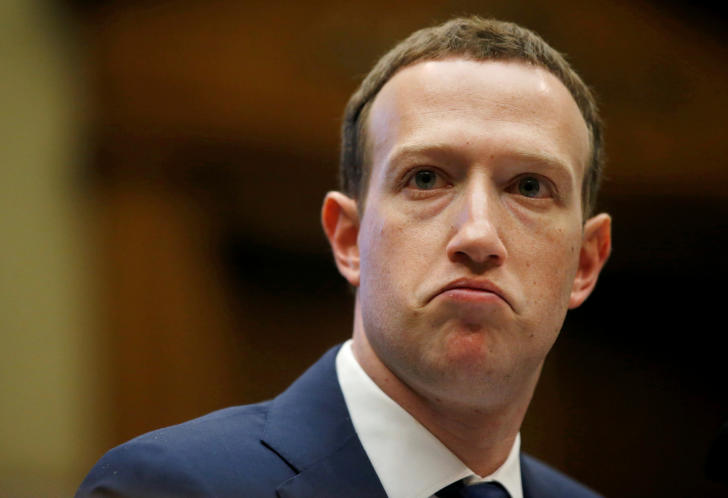Facebook (FB) CEO Mark Zuckerberg wasted no time on Wednesday explaining to lawmakers why he believes the company is not an illegal monopoly, during what was announced as a hearing in Congress to investigate antitrust concerns.
However, the questioning was diverted into a mix of issues that included data privacy, content moderation, corporate citizenship, electoral integrity, censorship, and surveillance.
In his opening statement, the tech billionaire, flanked by tech giants Tim Cook, Jeff Bezos and Sundar Pichai, said Facebook faces intense global competition in the connection and advertising markets in which it operates.
“Many of our competitors have hundreds of millions or billions of users, some are beginners, but others are gatekeepers with the power to decide whether we can launch our apps in their app stores to compete with that,” said Zuckerberg.
“In many areas, we are behind our competitors,” he argued.

Facebook CEO Mark Zuckerberg testifies on Wednesday, July 29, 2020 before the House Judicial Subcommittee on Antitrust, Commercial and Administrative Law
Zuckerberg added that Facebook also competes against tech companies whose leaders sat in the hot seats next to it. Specifically, Alphabet’s Google (GOOG) as the largest advertising platform; Apple IMessage (AAPL) as the most popular messaging service in the United States; Alphabet’s YouTube as the fastest growing video platform; and Amazon (AMZN) as the largest online retailer, all pose competitive threats.
“For every dollar spent on advertising in the United States,” said Zuckerberg, “less than 10 cents is spent on us.”
Still, lawmakers were not convinced that Facebook’s deals with potential competitors have been kept open enough to withstand antitrust scrutiny.
Most of the anti-competitive allegations focused on the acquisition of Instagram from Instagram and WhatsApp helped its growth share 20% of a duopoly with Google in the digital advertising industry.
Representative Pramila Jayapal (D-WA) accused Facebook of using its power to threaten rivals with the cloning of their products and the acquisition of their companies, including Instagram founder Kevin Systrom and Snapchat founder (SNAP) Evan Spiegel.
Jayapal noted the communications between Facebook and Systrom, obtained by the subcommittee, that preceded the acquisition of Instagram in 2012 by Facebook. The exchange showed that the social network communicated to Systrom that it was developing its “own photography strategy,” and that Instagram’s engagement with Facebook would determine the extent to which companies would operate as future partners against competitors.
Zuckerberg disagreed with characterizing the correspondence as a threat, saying that at the time, the relationship between Facebook and Instagram was well documented. It was clear that the photo-sharing space was one in which Facebook was going to compete “one way or another,” said the CEO.
He added that at the time of the acquisition it was not clear that the platform would be successful, and that the Federal Trade Commission did not oppose the acquisition.
Representative Joseph Neguse (D-CO) accused Facebook of becoming a monopoly at the time it acquired Instagram, and of aggravating its dominance with its subsequent purchase of WhatsApp in 2014. Zuckerberg argued alternatively that the acquisition introduced competition against the companies. For telecommunications, by dropping text, the message charges 10 cents per text to private messages for free.
Along with Neguse, Rep. Matthew Gaetz (R-FL) asked Zuckerberg about a 2014 message from Facebook CFO David Wehner, referring to the company’s M&A strategy as a “takeover land “, and a 2012 message from Zuckerberg that said” one But what happens with startups is that you can often acquire them ”
Representative Valdez Demings (D-FL) accused Facebook of “applying weapons” to its policies to restrict competitors, including Pinterest, from accessing its main platform. Zuckerberg recognized Pinterest as a social competitor, stating that at that time in 2012, the company had a policy to restrict the use of competitors.
Lawmakers also questioned Facebook’s purchase of Onavo, allowing the company to see the extent to which consumers were using WhatsApp before buying the popular messaging app, and the company’s alleged actions to dismantle its programming interface or application programming interface (API) in response to competitive threats.
Against the broad scope of the questions, Zuckerberg and the other technology leaders made clear in their prepared statements that they were aware of the tensions between the United States and China, and the role that the antitrust plays in its ability to compete with the country’s technology. , and in a global context. scale.
“Businesses are created all the time around the world, and history shows that if we don’t continue to innovate, someone will replace all businesses here today,” said Zuckerberg.
“That change can often happen faster than expected. Of the 10 most valuable companies a decade ago, only 3 are still on that list today. If you look at where the major tech companies from the vast majority were Americans today. Almost half are Chinese, “he added.
[Click the following links for more of Yahoo Finance’s coronavirus coverage: Personal finance tips, news, policy, graphics & more from Yahoo Finance]
Follow Yahoo Finance on Twitter, Facebook, Instagram, Flipboard, LinkedIn and reddit.
